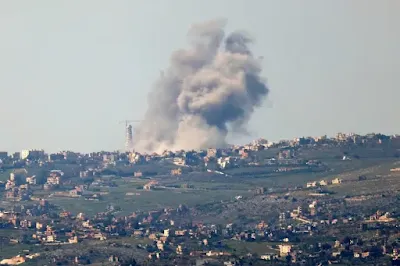Israeli Airstrike on Beirut: Rising Tensions and Conflict in Lebanon
Sraeli Raid on Beirut: Tensions Escalate in Lebanon
Beirut, Lebanon – Early today, a significant Israeli airstrike targeted a location in Beirut, escalating tensions in the region. The raid marks another chapter in the ongoing conflict between Israel and various militant groups in Lebanon, particularly Hezbollah, which has a strong presence in the country.
Details of the Raid
The strike took place in the southern part of Beirut, an area known for its association with Hezbollah, although initial reports did not confirm whether the militant group was directly targeted. Eyewitnesses reported hearing loud explosions in the early hours of the morning, followed by plumes of smoke rising from the site of the attack. Lebanon’s Ministry of Defense has condemned the strike, describing it as a violation of the country's sovereignty.
Lebanese authorities have yet to release a full statement on casualties, though local sources indicated damage to several buildings and infrastructure. There are also reports of injured civilians, with emergency services rushing to the scene.
Context: Rising Tensions
The Israeli airstrike is the latest in a series of military confrontations that have plagued Lebanon in recent months. Hezbollah has long been a major player in the region, having fought multiple conflicts with Israel since its formation in the 1980s. The group’s stronghold in southern Lebanon, particularly in Beirut’s southern suburbs, has made it a focal point for Israeli military operations.
While the exact reasons behind today’s raid remain unclear, analysts suggest that Israel’s actions could be part of a broader strategy to curb Hezbollah’s growing influence in the region, especially in the context of ongoing Syrian civil war dynamics and Israeli concerns over Iran's support for the group.
International Reactions
The international community has expressed growing concern over the escalation of violence. The United Nations has called for restraint on all sides, urging both Israel and Hezbollah to avoid further provocations that could destabilize the already fragile situation in Lebanon. The United States, a key ally of Israel, has refrained from commenting on today’s strike but has previously expressed support for Israel’s right to defend itself against what it deems terrorist organizations.
Meanwhile, neighboring countries such as Syria and Iran, both known to have strategic alliances with Hezbollah, have condemned the attack and vowed to stand in solidarity with Lebanon in the face of Israeli aggression.
Lebanon's Political Response
Lebanese political leaders have expressed outrage over the Israeli raid, with calls for stronger diplomatic actions and international support. Prime Minister Najib Mikati and President Michel Aoun condemned the attack, labeling it an act of war. There are fears that these provocations could reignite broader hostilities in the region, especially as Lebanon remains politically divided and economically unstable.
Impact on Lebanon’s Civilian Population
For the Lebanese people, already reeling from a protracted economic crisis, the violence only adds to the daily challenges of survival. Beirut, once known as the "Paris of the Middle East," has faced massive challenges since the 2020 explosion at the port, and many fear that today's raid could mark a further deterioration of the situation.
Citizens in the southern suburbs of Beirut, an area home to both Hezbollah and many civilian families, have voiced concerns about the ongoing threat of Israeli airstrikes. Many Lebanese families are already living in precarious conditions, struggling with unemployment, food shortages, and a collapsing healthcare system.
Conclusion: A Fragile Peace in Jeopardy
As tensions mount, the prospect of a wider regional conflict looms large. The Israeli raid on Beirut serves as a stark reminder of the fragile peace in Lebanon and the broader Middle East. It is crucial for all parties involved, including international mediators, to prioritize diplomacy over military action to prevent further loss of life and regional instability.
The situation remains fluid, and developments are likely to unfold in the coming days. The people of Lebanon continue to endure a complex and painful reality, marked by both internal and external pressures, with little sign of relief on the horizon.










